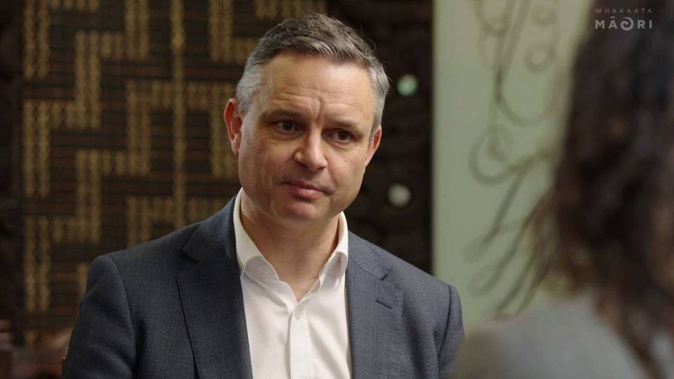
“There is misogyny and racism around that is extremely distressing. And as a frankly, middle-class white man, I don’t get exposed to anything like what they get exposed to.”
James Shaw, co-leader of Green Party of Aotearoa-New Zealand, responds to a question on Te Ao with Moana about how safe he feels after being violently attacked by a stranger near Parliament nearly four years ago. While Shaw admits he still doesn’t walk home at night, he’s more concerned about the “level and kind of violent language” directed at particularly brown female MPs.
“It is several orders of magnitude worse than I have ever faced,” Shaw said.
The former management consultant first entered Parliament in 2014 and in his time, has survived two leadership challenges by delegates including a shambolic attempt in 2022. It signals a longstanding tension between the activist and parliamentary leadership wings of the party. After nearly a decade inside Parliament, Shaw remains convinced that “being at the decision-making table, helping to change laws and direct resources to where they are needed is essential to resolving big long-term issues”.
The Greens currently support Labour through a confidence and supply agreement, have nine MPs in the House and hold two ministerial portfolios. Shaw is Minister for Climate Change while co-leader Marama Davidson is Minister for the Prevention of Family and Sexual Violence.
Shaw says he “can’t imagine a possibility in which, if National and Act and New Zealand First got together to form a majority government, that the Greens could be a part of that and nor would they want us to be”.
Te Tiriti o Waitangi
The Green co-leader celebrates “the promise and potential of te Tiriti” and explains that “all Green Party policy is viewed through a Tiriti lens” before it is released. He expresses frustration at the fear-based narrative he says other parties perpetuate when it comes to te Tiriti.
“It would actually create a better country for all of us. And I think this is a point that is continuously lost on our opponents in National and Act and NZ First,” Shaw says.
“The idea of sharing power and sharing space does not mean that you are kind of losing everything. And the thing that makes me so angry about the way that they’re communicating right now is that they’re saying to people who currently have privilege, that if you just share that privilege, then you lose everything. It’s a fear-based narrative and it’s wrong.”
Shaw believes that honouring te Tiriti can be justified in terms of long-term economic benefits as well.
“This is the thing that drives me a bit batty about what I hear over on the right side of politics is this, you know, cost-based approach and actually if we focus on lifting people out of poverty, if we focus on having an inclusive society … then the impact of that is lower costs in health and education … over a very, very long time.”
/cloudfront-ap-southeast-2.images.arcpublishing.com/nzme/JAPEWB5UGRB5JDZAWFCSYI5XKI.jpg) James Shaw is interviewed by Moana Maniapoto. Photo / Te Ao Māori News
James Shaw is interviewed by Moana Maniapoto. Photo / Te Ao Māori News
Hoki Whenua Mai
In 2022, Te Ao Māori News reported a discussion document outlining the Greens’ Hoki Whenua Mai policy paper. Davidson said then that New Zealand was approaching the 185-year anniversary of the signing of the Treaty of Waitangi and that now was the right time to “reflect on next steps to ensure the promise of Te Tiriti is honoured and wrongs are put right”.
The paper included recommendations for the return of private land wrongfully taken from Māori as that land comes on to the property market, a move described as a potential “hornet’s nest” by Treaty Negotiations Minister Andrew Little.
Shaw, however, explains how parts of the policy were eye-openers to the public.
“When we said that we were going to end perpetual leases on Maori land, it came as a shock to people to learn that there were perpetual leases on Maori land. So that’s just a fundamental injustice that we’ve had absolutely no argument against. We just need to get on and do it,” Shaw says.
The Greens also champion the return of land seized under the Public Works Act to Maori if that land is no longer required for that purpose.
“There’s quite a lot of land actually, that is in Crown hands, right? And then the third one is about ensuring that the Public Works Act is not used to seize yet more Māori land the way it had been historically. If people want to take issue with any of those things, that’s up to them. But I would say that, basically, those are fundamental injustices that need to be fixed. And you could argue that it’s a red rag bull in an election year but I would just say it’s the right thing to do.”
Time is now
“Well, we are out of time,” responded Shaw when asked to explain the Greens billboard slogan.
“If you ask the people who in Tāmaki Makaurau lost their homes due to the floods or in Hawke’s Bay who were displaced by Cyclone Gabrielle, you know, can we continue to kick the can down the road on climate action? They would say no.
“If you talk to people who are trying to save our native wildernesses and wildlife from extinction, can we continue to kick the can down the road there? And if you’re talking to the parents or someone, you know, who is struggling to put food on the table or pay the power bills at the same time, can we do this incrementally? They would say no. So, what we’re saying is that actually now is the time to solve those problems and we have a plan to do that.”
Given there are still people out there who don’t believe the climate crisis is actually a thing, have the Greens dropped the ball in convincing people?
“No, we have not,” Shaw says. “I actually think that we’re doing really well. In the last quarter of last year, the level of pollution that we’re putting into the atmosphere is the lowest that it has been this century so in the last 23 years. That is a huge success because, up until we got into government, the levels of pollution just kept going up and up.
“When we do public opinion surveys, we know that the vast majority of the country is very worried about climate change. If anything, they want the government to do more.”
While Shaw hesitates when asked whether the climate crisis keeps him up at night, the co-leader remains hopeful.
“I see all of the data about how bad things are and how bad things are getting,” he replies. “But I also see all the good things and they’re changing much more rapidly than I think most people can see or perceive. Hope is not a passive thing to me. It’s an active thing, it’s a doing word. I think we’re going to get through this, not by kind of resting on our laurels… it’s going to take a lot of work and it’s going to take all of us and it’s gonna take everything we’ve got. But there is hope.”
-Moana Maniapoto, Whakaata Māori
Take your Radio, Podcasts and Music with you









